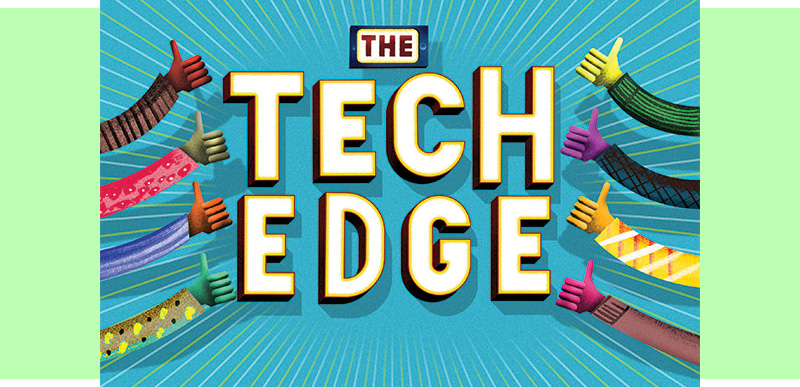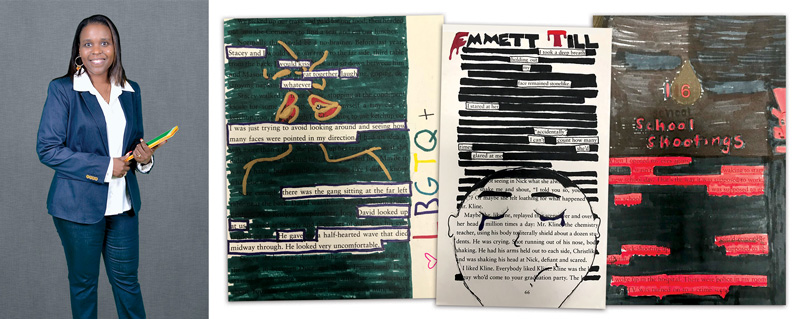Tech Leaders: Good Citizenship & Social Justice
Four innovators use technology to bring out the best in their students and their communities.

What makes a tech leader? The 16 influencers we profile this month have found innovative ways to leverage technology to enhance STEM and STEAM learning, amplify reading and research, and more. From activism to aquaponics and breakerspaces to self-publishing centers, their pursuits inspire. These four individuals focus on social justice, digital citizenship, media literacy, and other issues. It all starts in the library.
 |
Joquetta Johnson (left); blackout poetry created by her students. |
Four Tech Influencers
|
Joquetta Johnson
Library Media Specialist, Randallstown High School, Baltimore
Joquetta Johnson’s idea for an #activism lesson started in 2015, when a black man named Freddie Gray died in police custody near her Baltimore school district. Johnson wanted to help students work through their pain and fear. They studied the Black Lives Matter movement and how hashtags most effectively bring people together to advocate for social justice.
Now, they choose a social justice issue to research and create a hashtag for it. “We always say, ‘don’t do this, don’t do that’ on social media,” says Johnson. “I wanted to show them a positive aspect and how they can use their voices. I always try to leverage technology to level the playing field.”
In another project, students analyze poetry by Tupac Shakur and Childish Gambino’s This Is America video. Using Padlet, Johnson curates a collection of YouTube videos from diverse perspectives to help students develop their analyses. They also read Angie Thomas’s The Hate You Give. Students responded with blackout poetry, created by blacking out pages of a text except for selected words, and had the option of sharing it via social media. “Part of using tech well is understanding when to bring it out and when to put it away,” says Johnson. Blog: The Digital Diva; Twitter: @accrodin2jo
 Kristen Mattson
Kristen Mattson
Library Media Center Director, Waubonsie Valley High School, Aurora, IL
Should a principal be able to search a student’s social media profile? What about a college admissions officer or future employer? When you take a Disney vacation, your thumbprint becomes your ticket. What if the government wants that?
These are questions that Kristen Mattson asks government class students who are studying the Supreme Court. It’s one way she weaves digital citizenship into a class, discussing privacy and security topics highly relevant and engaging to students.
“I’m working to expand the definition of digital citizenship to what it means to be human in this digital age,” she says. “Most people say it means being nice online, but I think it’s about how we are engaged in a global community of citizens.”
Her philosophy around tech in the library involves giving kids access to experiences they wouldn’t otherwise have. Her school is 1:1 with Chromebooks, and the library has become a home for STEM kits and different engineering courses with Arduino and Hummingbird. Students who aren’t taking the courses can still use those tools at the library. Mattson works with adults even more than students. A 2018 ISTE Emerging Leader, she moderates the Future Ready Librarians’ Facebook group. Website: drkmattson.com; Twitter:@DrKMattson
 Jennifer Gladkowski
Jennifer Gladkowski
Librarian, Village Community School, New York City
Imagine a commercial showing a husband and a wife on a sofa. The woman begins to cry. The husband says she’s too emotional. Conflict? Not anymore! The husband goes into the Hug Machine and cries along with his wife.
That’s just one of the gender stereotype-busting commercials created by Jennifer Gladkowski’s sixth graders in her media literacy unit. Students also study toy ads to understand the intended audience and message, and then write an original commercial or a counter-narrative for an existing one. They film it, edit it in iMovie, and present it to the class. “Our conversations have gotten heated,” says Gladkowski. “The kids have strong views about gender types and roles. We’re changing young minds here.”
She works with teachers to design learning experiences that bring in tech. When one teacher’s class had produced more papier-mâché projects than could be displayed in one room, she helped students photograph their projects with a green screen and produce a poster.
“What excites me most about ed tech is when students are creating authentic, original content based on the information they consume,” she says. “[It] opens up creative possibilities.”
 Christina Larrechea
Christina Larrechea
Teacher Librarian, Frontier Middle School, Vancouver, WA
While teaching digital citizenship to her entire K–5 school, Christina Larrechea uses breakout boxes. Student groups solve a puzzle and open the lock on the box, requiring tech and collaboration skills. The boxes, purchased from Breakout EDU with a grant from the Evergreen Public Schools Foundation, contain items Larrechea assembles for each week’s lesson. During the fourth grade copyright lesson, students watch a video, solve a jigsaw puzzle, and complete a crossword puzzle while learning about plagiarism, copyright, and citation. Using clues from these tasks, they break into the box to find their masks and a little money bag with chocolate coins.
As the campus tech expert and fixer, Larrechea initially struggled to find time for digital citizenship lessons. She recruited help, training one student per class to fix simple things such as resetting passwords or fixing trackpads. In the first semester, she had 300 requests for help. Once her Tech-Xperts were up and running, requests for help were cut in half. Twitter: @Larrecheareads
Based in Eugene, OR, journalist Jennifer Snelling (@JdsnellJennifer) writes about teachers and students changing the world.
Tech Edge illustration by Jeff Rogers
RELATED
The job outlook in 2030: Librarians will be in demand
The job outlook in 2030: Librarians will be in demand
ALREADY A SUBSCRIBER? LOG IN
We are currently offering this content for free. Sign up now to activate your personal profile, where you can save articles for future viewing





Add Comment :-
Be the first reader to comment.
Comment Policy:
Comment should not be empty !!!